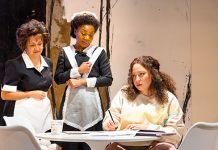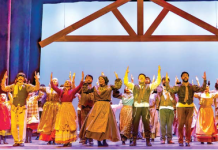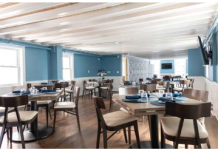By Philip Dorian
Formed in 1962 to present its namesake’s plays, the (George Bernard) Shaw Festival, in scenic Niagara-on-the-Lake, Ontario, 20 minutes from Niagara Falls, has expanded to include plays from and about Shaw’s era as well as contemporary works that reflect his views.
Works by Ibsen, Chekhov and Noel Coward have graced festival stages in recent years, and this season, along with the musical Guys and Dolls, which opened 22 days after Shaw’s death in 1950 at age 94, Oscar Wilde’s 1892 Lady Windermere’s Fan and W. Somerset Maugham’s Our Better (1917) join the ranks.

Rigid Victorian standards did not subside with that queen’s death in 1891. Propriety remained a priority through that decade, and no play exploits that to better effect than does Lady Windermere’s Fan. The play is well-mannered, but not stuffy or moralistic. The 1890s come to life and, while the characters are straitlaced, the situation that engulfs them is not.
One afternoon, Lady Windermere discovers that her husband has been paying rent on a house for Mrs. Erlynne, a widow of questionable reputation. He even invites her to that evening’s ball, celebrating his wife’s birthday. Shocking, yes; but as secrets are revealed, what develops between the two women that evening and into the next day is as intriguing as anything written since.
Played by the marvelous Marla McLean and Tara Rosling, Lady W. and Mrs. E. become a compelling pair, whose values eventually coincide. Some of Oscar Wilde’s characters may be stuffy, but the playwright was no bore. Neither is this play nor its superlative cast. With Lady Windermere’s actual fan, a birthday gift from her husband, playing a fascinating role in the plot, Lady Windermere’s Fan is terrific theater.
W. Somerset Maugham’s Our Better is set in pre-World War I, when it was not uncommon for wealthy American women to settle in London for the purpose of snagging a titled British husband. Love was not necessary, and the targeted lords and dukes were usually on their uppers (broke). The women became Lady Somebody and the men became solvent: a mutually beneficial arrangement.
Rarely has a play educated so entertainingly on so interesting a topic. Each of four women has either made such a match, recently ended one, or is seeking one. Their desperation, resignation or uncertainty is unveiled in a highly amusing flow of acid wit.
Bessie has come from America to stay with her sister Pearl, a conniving matchmaker, married herself, with several catty women friends and a “benefactor” on the side. Two fellows vie for Bessie’s affections: the British Lord Bleane and Bessie’s former American sweetheart who has followed her to London.
Over three acts that fly by, one woman gets her comeuppance, one becomes engaged, one finds contentment as is, and bubbly Bessie, played by bubbly Julia Course, ends up paired with … well, it is a happy ending.
The Shaw’s Guys and Dolls is energetic and splashy, but there is something off-putting about it, as if director Tadeusz Bradecki, whose credits include “numerous awards for directing in Poland,” feared that Canadian audiences wouldn’t “get” Damon Runyon’s 1950 New York City.
To compensate, the cast exaggerates as if “translating” the text. Voices are pinched up and final consonants are omitted in search of a New York City accent; gags are oversold and lyrics are “indicated” (singing “stars in the sky” requires pointing upward). What makes Guys and Dolls a classic, besides Frank Loesser’s score (“I’ll Know,” “If I Were a Bell,” etc.) is that the characters are real. Despite their unusual names, Nicely-Nicely Johnson, Harry the Horse and Rusty Charlie are not cartoons.
That said, there’s some decent singing and acting among the principles, and a well-choreographed “Havana” ballet.
It’s hard to argue with Guys and Dolls box office success. I do hope, however, that people don’t come away believing that Miss Adelaide developed a two-syllable co–eld.
These three plays run into October, as do Enchanted April, The Light in the Piazza and Shaw’s Major Barbara. Niagara-on-the-Lake is in the heart of Niagara’s wine region, a seven-hour drive from Central New Jersey. For schedule and lodging details, as well as information about area attractions: www.shawfest.com.














